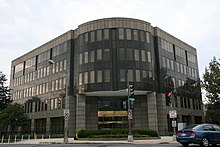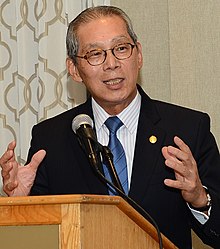Taipei Economic and Cultural Representative Office in the United States
| 駐美國臺北經濟文化代表處 | |
 Taipei Economic and Cultural Representative Office in the United States | |
| Agency overview | |
|---|---|
| Jurisdiction | |
| Headquarters | Washington, D.C., United States |
| Agency executive |
|
| Parent agency | Ministry of Foreign Affairs, Republic of China |
| Website | Taipei Economic and Cultural Representative Office in the United States |
The Taipei Economic and Cultural Representative Office in the United States (Chinese: 駐美國台北經濟文化代表處; pinyin: Zhù Měiguó Táiběi Jīngjì Wénhuà Dàibiǎo Chù) represents the interests of Taiwan in the United States in the absence of formal diplomatic relations, functioning as a de facto embassy. Its counterpart in Taiwan is the office of the American Institute in Taiwan (AIT) in Taipei.[1]
History[]
Prior to 1979, the Republic of China (Taiwan) was represented in Washington by its embassy, occupying the building now used by Haiti[2]. After the transfer of recognition of China to the People's Republic of China, the Republic of China was no longer recognized by the United States, and therefore no longer entitled to use the former embassy, with its diplomatic mission replaced by the current Taipei Economic and Cultural Representative Office. The mission serves as the office of the Coordination Council for North American Affairs (CCNAA) in Washington DC, established in 1979 as the counterpart to AIT, after the United States established diplomatic relations with the People's Republic of China.[3] The council was renamed Taiwan Council for US Affairs in 2019.[4][5]
In 1994, as a result of the Clinton Administration's Taiwan Policy Review, the name of the CCNAA office in Washington, D.C. (which functioned as an embassy) was changed to Taipei Economic and Cultural Representative Office (TECRO).[6] Similarly, the names of the twelve other CCNAA offices (which functioned as consulates) were changed to Taipei Economic and Cultural Office (TECO).[7]
In September 2020, the US Ambassador to the United Nations Kelly Craft met with James K.J. Lee, director-general of the Taipei Economic and Cultural Office in New York, who was secretary-general in Taiwan’s Ministry of Foreign Affairs until July, for lunch in New York City in what was the first meeting between a top Taiwan official and a United States ambassador to the United Nations.[8] Craft said she and Lee discussed ways the US can help Taiwan become more engaged within the U.N., and she pointed to a December 2019 email alert from Taiwan that WHO had ignored, recognizing and warning about the danger of the person-to-person transmission of the new highly contagious Covid-19 virus in China.[8]
Representatives[]

CCNAA Representatives[]
- James Shen (1 January 1979 – 9 May 1979)
- , 1979–81
- , 1981–82
- Fredrick Chien (19 November 1982 - 20 July 1988)
- Ting Mao-shih, 1988–94
TECRO Representatives[]
- , 1994–96[9]
- Jason Hu, 1996–97
- Stephen S. F. Chen (1997–2000)
- Chen Chien-jen (30 June 2000 – 20 May 2004)
- David Lee (25 July 2004 – 10 April 2007)
- Joseph Wu (10 April 2007 – 26 July 2008)
- Jason Yuan (4 August 2008 – 27 September 2012)
- King Pu-tsung (27 September 2012 – 24 March 2014)
- Shen Lyu-shun (1 April 2014 – 5 June 2016)[9]
- Stanley Kao (5 June 2016 – 24 July 2020)
- Hsiao Bi-khim (24 July 2020 – present)
US representation[]
Including:
- Law firm Alston & Bird with former Senator Bob Dole as registered lobbyist, with a $25,000 monthly retainer; two decades of representation by Dole as of 2016.
- Richard A. Gephardt, former Congressman, a $25,000-a-month contract; 2016.
- Thomas A. Daschle, former Senator, a $25,000-a-month contract; since 2015.[10]
See also[]
- Diplomatic missions in the United States
- Taipei Economic and Cultural Representative Office
- Taipei Economic and Cultural Office in Houston
References[]
- ^ "American Institute in Taiwan". American Institute in Taiwan.
- ^ James M. Goode (2003). Capital Losses: A Cultural History of Washington's Destroyed Buildings. Smithsonian. p. 264.
- ^ Courage and fortitude, Taiwan Review, May 1, 1979
- ^ "台美關係突破!「北美事務協調委員會」更名「台灣美國事務委員會」 - 政治". 新頭殼 Newtalk. 25 May 2019.
- ^ "The Coordination Council for North American Affairs renamed the Taiwan Council for US Affairs - Taipei Times". www.taipeitimes.com.
- ^ Su, Chi, Taiwan's Relations with Mainland China: A Tail Wagging Two Dogs (at Google Books), (Routledge, 2009), page 31.
- ^ "1994 Taiwan Policy Review." Formosan Association for Public Affairs. Retrieved on January 28, 2009.
- ^ Jump up to: a b "US envoy to United Nations meets with Taiwan official in NY". ABC News.
- ^ Jump up to: a b Tsao, Nadia, US demands replacement of Taiwan representative, Taipei Times, January 10, 2015.
- ^ Davis, Julie Hirschfeld, and Eric Lipton, "Bob Dole Worked Behind the Scenes on Trump-Taiwan Call 点击查看本文中文版", New York Times, December 6, 2016. Retrieved 2016-12-07.
External links[]
| Wikimedia Commons has media related to Taipei Economic and Cultural Representative Office in the U. S.. |
- Taipei Economic and Cultural Representative Office in the United States
- Taiwan in the US on Facebook
- Taiwan mission to the US on Instagram
- Taiwan in the US on Twitter
- Taipei Economic and Cultural Offices
- Diplomatic missions in the United States
- Diplomatic missions in Washington, D.C.
- Taiwan–United States relations